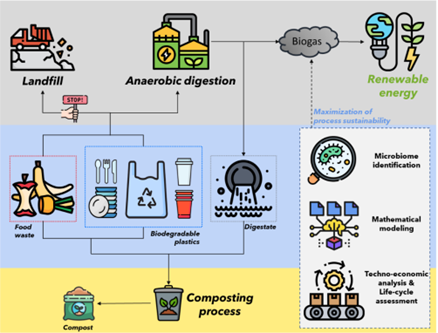Project Scope
The rising demand for sustainable alternatives to single-use plastics has accelerated bioplastic use. However, their role in waste treatment processes like anaerobic digestion (AD) and composting is still poorly understood, often viewed as pollutants. This project aims to explore the biodegradability of commercially available bioplastics under anaerobic and composting conditions. By investigating their co-digestion with food waste (FW) and identifying the key microorganisms involved, we will develop mathematical models and assess the sustainability of these processes. The research will provide essential insights into biogas production, composting efficiency, and offer a clear path for the future of biodegradable plastics and FW valorization.
Schematic description of the VALOPLAST project

Goals
- The extensive study and evaluation of commercially available products made by biopolymers regarding their biodegradability under anaerobic mesophilic and thermophilic conditions
- The anaerobic co-digestion investigation of bioplastic materials and food waste (FW)
- The study of the composting process for bioplastic materials degradation
- The determination of the most promising bacteria and archaea for degradation of bioplastic materials
- The development and verification of a mathematical model for bioplastic materials anaerobic or aerobic degradation
- Process sustainability assessment: The developed processes of AD and composting will be evaluated through LCA and TEA with a view to applying VALOPLAST findings at pilot and industrial scale.


